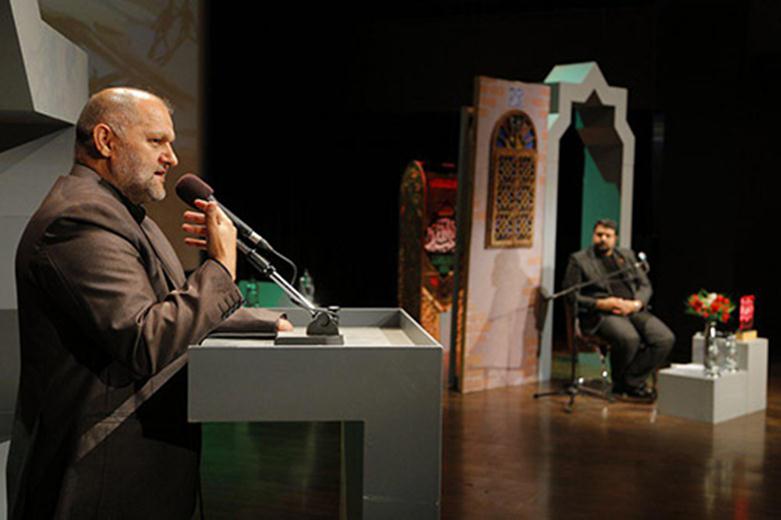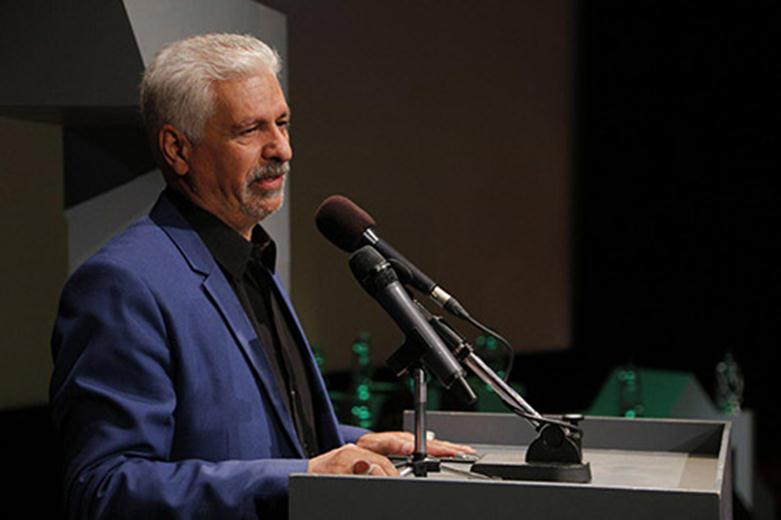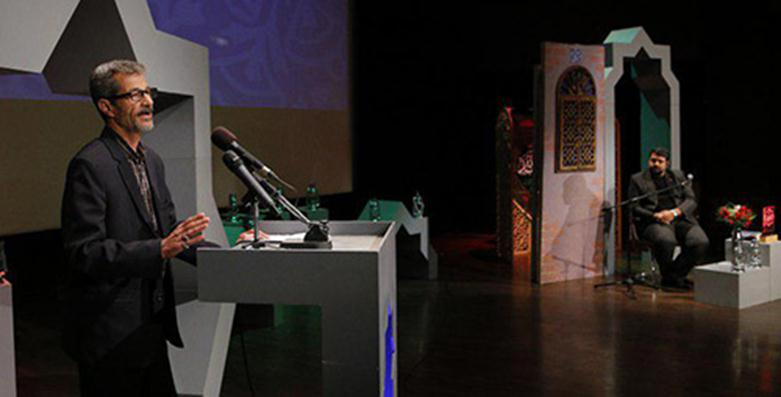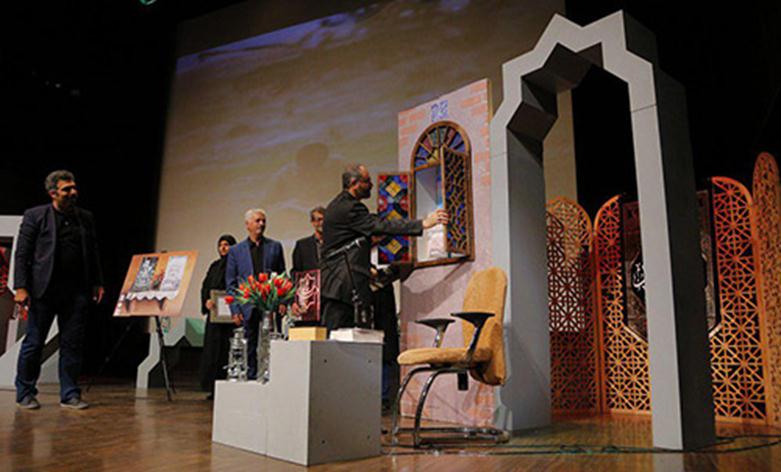Champions of Valfajar Moghadamati, Sumar and Syria
Maryam Rajabi
Translated by Ruhollah Golmoradi
2017-10-17
According to Oral History Website of Iran, 284th meeting of the series of Sacred Defense's memory night was held in Sooreh Hall of Hozeh Honari on Thursday evening, September 28, 2017. In the session, Majid Yousefzadeh, Seyyed Ahmad Nabavi and Rahim Afshar spoke about their memories of imposed war of Saddam Hussein against Islamic Republic of Iran.
Memories of battles of Syria
Majid Yousefzadeh, the first lecturer of the meeting and one of Sacred Defense disabled veterans and a fighter of Holy Shrine Defender, stated, "We had many people in Syria who were captured and decapitated but why Mohsen Hojaji was highlighted at the extent? Perhaps a picture or a glance of him when he was captured told us many things. We did not see Abdollah Eskandari or Reza Esmaeili, who was from Afghanistan, but what was secret of martyr Hojaji's look that had such strength and rigor at the last moment? Just when he was going to be tortured and then decapitated.
If you read biographies of holy shrine defenders, you will find that most of them had fighter fathers, or were of IRGC, or martyr families. Uncle of Mohsen Hojaji, Mohammad Ali Hojaji also had died a martyr. He was a seminary student and from Najafabad who died a martyr in Operation Muharram in 1982. The guys in the operation had to pass seasonal Daviraj River. The water didn't touch knees. The guys prepared and did detection. There was a very heavy rain in the operation night. The water was deep about 3 meters. They were not ready. They were supposed to go to the water. About 300 people were sunk and died a martyr. Martyr Mohammad-Ali Hojaji said that I would teach you a secret to dive into water and pass it; everybody says three times: "Ya Aba Saleh Al-Mahdi Adrekni[i]", Hazrat would take his hand and would pass the water. One of people who were there said this and passed the water. Guns of many of the guys fell in the water and went without weapons and seize the enemy front line in Operation Muharram.
Martyr Zulfaqar Hassan Ezuddin who was from Lebanon, wanted to go to Syria in age of 17. His Mother and father were not satisfied. Before going, he had said that he had dreamt had gone to Syria, and an ISIS forces captured him and sat on his chest and wanted to decapitate him. He had shaken and shouted. At that moment Imam Hossein (AS) had come to him and said: "Do not afraid, it isn't painful. When they wanted to decapitated us, a lot of angels surrounded as we had no sense of being decapitated." Martyr Ezuddin had previously told his mother that he would be martyred and decapitated and his body would come back without head. In Ashura night, Imam Hossein (AS) saw their place through his two fingers, and perhaps the mystery had been revealed to Mohsen Hojaji too that angels and Imam Hossein (AS) would visit him and it wouldn't be painful, and "with their Lord, and they have provision[ii]" would be started from there. That was why he went with enthusiasm towards the enemy without fear."
He added, "About forty days ago, one of shrine defender commanders died a martyr in Syria that Haj Qasem Soleimani said when he heard his martyrdom news, he did not sleep until the morning and said he wished he had died a martyr and Hossein Qomi was alive; Hossein Qomi was future of IRGC. He was one of the honored people who created epics in the six years of defense in Syria. When ISIS attacked his axis, who was commander of the headquarter, he ordered the guys to evacuate the first and second axes and go to the third axle to stand with each other and defend, but he himself stood ahead while he was struck by a quiver and killed eleven ISIS forces so that the guys retreat and in fact he saved their lives and himself died a martyr due to bloodshed."

Yousefzadeh said, "Martyr Mehdi Nazari was from Andimeshk." When the guys attacked the enemy, the enemy severely resisted, and when it did anti-attack, the guys were forced to retreat. He had been struck by a quiver and his stomach had been opened. The guys took him hardly in order to take him back, he said, "My task is over, leave me here and go, just give me all of your magazines before going, and then go back." When the guys arrived at higher height and were able to stabilize the area, voice of Mehdi conflict with the enemy was still heart, and he shot until the last bullet and died a martyr, and his body was not returned."
He continued, "The guys of Isfahan did an operation in Khan Tuman area to release it." During returning, some of Mazandaran guys died a martyr and their noble corpses were stayed there. Al-Nusra Front usually comes from both sides and sheared them and martyred them one by one and takes them. In liberation operation of Khan Tuman, they sheared them, and 50 of Isfahan's guys were trapped in siege. Faramarz Rezazadeh and four of his friends, all of whom were commanders of equipment of Division Imam Hossein, went to release those 50 people. They took Mini Katyusha (107mm rocket launcher) to high height and asked rest of the guys to not go up. The guys brought ammunition down the hill, these five people filled grips and then fired. The road was opened by shooting first bullets and the guys were coming. When the second series of the bullets were shot, a bullet struck at Rezazadeh, and bisected him and the three other dears died a martyr too."
Setting up memory night website
In continuance of 284th memory night of Sacred Defense, Ali Kashefipour, director of digital Hozeh Honari, announced setting up professional website and app for memory night, and said, "One of our rules is to use as much as possible all the abilities and resources which is inside and outside Hozeh Honari, so that we can do the plan in the best possible way. We did the first stage of unveiling memory night website today. The app can be downloaded through download link inside the site. The current content of website of video clips alongside audio files is among programs which have been hold in the past 25 years, and gradually you can see text of the programs on the site. There is an option to search by character on the site. We are preparing an Encyclopedia of characters who have told memory during these 25 years. Inshallah it will be possible to live play the program in website of www.shabekhatere.ir in December this year, which is 25th anniversary of memory night program."
The main hero of this book is Ms. F
Seyyed Ahmad Nabavi, narrator of one of books of Hozeh Honari's office of Resistance Literature and Art and Sooreh Mehr Publication titled "For Mrs. F" was the second narrator of 284th program of memory night of Sacred Defense. He is one of the sacred defense commanders who, by publishing a number of his personal letters and his wife in a book, added an emotional work to the sacred defense works, and he believes that families also have stepped in holy defense works and this is a blessing.

Seyed Ahmad Nabavi stated "In winter of 1982, Operation Valfajr Moghadamati was carried out." The operation was carried out after operations Fath ol-mabin, Beit ol-Moqaddas, Ramadan and Muharram. In the operation, we were great in terms of numbers and equipment. Dukuhe Garrison was packed out as the guys slept in courtyard. But we had two big problems: first, according to Imam Khomeini, we became very proud and said that with half of the forces we released Khorramshahr, captured 19,000 Iraqis in Fath ol-Mobin, and we will do a good operation with such forces. Second, Iraq had been hurt as much as in those two operations that it had one year time to prepare itself. In Operation Valfajr Moghadamati, one of shock trooper battalions was Ansar al-Rasul Battalion of Division 27 in which I was also deputy of one of companies of that battalion. The battalion officer was Jafar Aqeel Mohtashem, and remained commander of Ansar al-Rasul's battalion until end of the war. Martyr Abdullah Purut managed the company. He was of specific war martyrs whom I had honor of being his deputy. We were together in Imam Hussein garrison training course, and finally I became his deputy.
Before the operation, around 10 p.m., we arrived at the point of release: we stayed in order to have some rest and then announced movement. The weather was very cold. There was a strong wind. Purut and I put our two blankets upon each other and went under them to get warm. We were told to move around 1:00 a.m. night. We were the leading company of this battalion. We thought we had to walk about six or seven kilometers, and it took about one hour and till 1:45 a.m. but our calculation were wrong. One of reasons for this wrong calculation was that the guy burden was very high. Gravel decreased speed of the guy movement and they did not have the ability to move in the gravel easily. The very cold weather and anxiety and worry were also aggravated the situation. The farther away from the front line, the more apprehension. When you are anxious, your bladder will work more. However, instead of 1 to 1 and half hour, we walked about three hours, and when we were approaching Iraqis, the guys had slept. They collided and sound of their hamlets was heart. Our company was a 150-meter pillar. I had run twice more than the guys, because I went from ahead of the pillar to bottom of the pillar and said: Why are you talking or why you exit the pillar? When we arrived at Iraqi canals, they had been informed and relocated. Though we had detected three days ago, the land had been changed, the tolls had been relocated, and the canals had been changed. We hardly passed barbed wire and minefield and were very tired. When we reached the canal, we thought it was 40 or 50 centimeters, but it was a one and half meter canal. When we exited the canal, Iraqi ambush began to conflict. There was a too strong fire that we passed.
We arrived in a region that they had embedded DShK in ground in a way that when it fired it destroyed sole or ankle. Slightly ahead, they had embedded DShK in a way that hit knee and eventually they had leveled our heads. At around four or five in the morning, they said return the guys who were healthy. The guys were tired and had passed minefield and ambushes. Meanwhile, I saw Purut, whose arm had been shot in Operation Muslim ibn Aqeel. He told me he stay in the canal to lead the guys. He asked me to lead as many guys as I could. Since there was no time to discuss, I accepted. I was running that at that moment a bullet was struck at my pelvis and I fell. I led the guys in the same situation. I crept about a hundred meters and reached behind a hill where about 80 of the guys had gathered. Some were injured, some were healthy and some died a martyr. I asked them why they did not go, they said: "When we move, the sniper who sitting on the hill to start shooting. I said why do you not go through behind the hill? They said that sign of minefield was shaken and several fighters went on minefield and died a martyr. I was still creeping toward them who I saw a 16 year-old boy named Mohebbi. He urged me to return him. He said her mother bore him after 16 years and came to the front on his own insistence without getting his parent consent. I tried to calm him down, but after short time he died a martyr.
We went to minefield with some healthy people to clean it up. When we passed the minefield and reached down the hill, it was around six a.m. After the guys woke up, they all separated, and I who could not walk lasted two days to get there. A Iraqi helicopter, about four to five kilometers ahead, shot coup de grâce toward the injured people, and perhaps they did not think that there would still be an alive injured so close to Iraqis. I never remember image of martyr Mohebbi, a martyr who thought about his mother at the last moments of his life. In 1991 we went for exploration for something. Since I had walked for two days and knew the map better, they asked me to help them to find the guys. I remembered image of that hill, and I knew that if we found it, we would find about 80 martyrs, but we could not find it. As I was desperate I pointed out to a hand of poppy which had grown in a region, they dug there and found the martyrs, and martyr Mohebbi's corpse was also among those martyrs."
At the end of his speech, he said, "reason of naming the book "For Mrs. F" was that in our house, my sisters-in-law socialized and they also had people in the front, so we choose the sign in order not to open the envelop everyone. The photo on the cover is the first letter I sent after marriage and when I went to the front. I married January 08, 1984 and I went to the front in February 10 of the same year and wrote the first letter. This book more shows role of families in the war. In this book, you see about 50 letters that my wife and I wrote for each other. Many of conflicts and problems are mentioned in these letters. On some letters, there were teardrops. Finally I want to name three people; first, martyr Seyyed Hassan Nabavi, who was educating engineering of fighter aircrafts in United States. He came back to Iran, went to military service and Basij and died a martyr. I became injured in the war for 13 to 14 times, and each time my mother waited for news of my martyrdom (laughing) and she did not expect martyrdom of my brother who had educated abroad. The second one, my mother that it was impossible that I went to an operation at night and tomorrow my mother would not look for to find me in ambulances from Navab to Azadi Street. They put stone in Azadi Street and had opened a road for moving ambulances from airport to hospitals. The third is Mrs. F. In 1980, at age of sixteen, her brother died a martyr and at age of nineteen, her father died a martyr. She went herself and identified her father's body. Unluckily, I went for proposing her. I promised her mother not to go to the front and I accepted. After marriage, I begged her for a month, finally she accepted to go. The main hero of this book is Mrs. F (Fatemeh Jianpanah)."
The story of 402 Sumar hill
The third guest of 284th Program of memory night of the sacred defense was Rahim Afshar. He is narrator of book of "Saye Tak (The Shadow of Vine)", a fighter who was eight years of the holy defense in the front. Afshar said, "We, the military, did not have any expect and don't have no demand. What we did was our duty, without having to be a hero, nor even seeking heroism; as in our disciplinary rules, all of these issues are included. Our slogan was "Look, you must not be seen", "kill, you must not be killed". They did not insist on killing us, but wanted us to be more alert to save ourselves, because if a soldier was killed, there was no force to replace; as I am reminded of eleven staffers who entered platoon 120mm mortar in 1983, and in 1988, when the war ended, we were two who were saved of eleven. Another was the late Mohammad Pourali Rafiei, who God blessed him in 1999 due to effects of chemical injury and was not considered as a martyr. There is less reminisce on prowess of 450,000 army forces and NEZAJA personnel who were present at the front 18 months before the war, and today they are also ready in Syria and the border areas of the country."

He continued: "in October 15, 1983, the enemy did anti-attack on the 402 hill in area of Sumar. At that time, we had been in the front for about 9 months and, in order to have short rest, they returned our battalion a few times and sent a new battalion to the 402 hill. Those days coincided with 19th anniversary of founding Ba'ath party in Iraq, and Saddam made a statement to his commanders that he would give them the same number of Benz cars as if they could capture from Iran the 402 hill. The commander of Fourth Corps of Iraq accepted the mission. In October 15, 1983, the operation took place with five troops against 191th Battalion of Zahedan Division that replaced us. They fired us as if there weren't trenches, even an ant would not be alive.
At 11:30 p.m. they ordered battalion 146 to return to its last place. It lasted till 5 a.m. in October 15 that forces replaced. Iraq had dominated the hill and had come down. That hill was a hill that if you stood above it, you could see entire Iraqi land. The Battalion 146 captured, with the deaths of 70 to 80 people, the hill from Iraqi people till 5 p.m. in the same day. On October 17 two airborne battalions of 126 and 135 made a raid into Iraqi forces. It caused them to be confused, and Saddam said that you promised to capture that hill, so you must seize it and otherwise you would be executed. There was a sensitive point in the left end of the hill. There was a valley like a gutter that when Iraqi forces were under press they entered it to save theirselves. We had a watchful soldier named Shokrollah Alipour, who was from North of Iran. I told him that he would not ask me for a bullet otherwise there would be a force who is worthy to be shot. The operation took place again at 22:30 p.m. on October 21. Simultaneously we shot our first bullets like Iraqis, and choked them back soon. In that situation, Iraqis could resist only 40 minutes. Many of them were killed. One hour after the operation, they informed don't shoot. The shootings continued till 1:30 a.m. when Alipour shouted on the radiotelephone, and I understood it and attacked in the middle of the same gutter valley with a grip and a twelve shootings. I shot again and again, totally I fired there 36 rockets. Alipour told me don't fired, it doesn't need anymore. The fire raining was over, and I went about five or six in the morning to see what we had done and what had happened there. That valley had been become like an ant nest to be sprayed by poison. The war is not sweet, but it is a great honor to stand vigorously against this extensive invasion, and resisted it with a battalion; as the war was over at the same day. Many Iraqis were killed in that day as we evacuated the corps in 18 km behind the front line in an area called "Se Rah-e (Y-track) Kashipour in a week."

At the end of 284th program of memory night of Sacred Defense, there was book launch of two books of "For Mrs. F" and "Saye Tak" by Sooreh Mehr Publications. Mohsen Momeni Sharif, head of Hozeh Honari, and Raheleh Sabouri, author of these two books were presented. The next memory night program will be held on October 26, 2017.
Number of Visits: 4029
http://oral-history.ir/?page=post&id=7391
